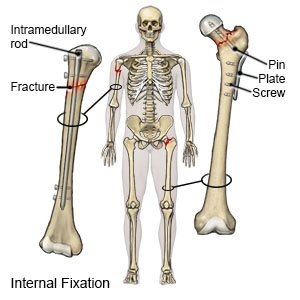ORIF
Medically reviewed by Drugs.com. Last updated on Apr 6, 2025.
What do I need to know about open reduction and internal fixation (ORIF)?
ORIF is surgery to fix a broken bone. Open reduction means that the bone is moved back into the right place with surgery. Internal fixation means that hardware (such as screws, rods, or pins) is used to hold the broken bones together.
 |
How do I prepare for ORIF?
- Your surgeon will tell you how to prepare for surgery. He or she may tell you not to eat or drink anything 6 to 8 hours before your surgery. Arrange to have someone drive you home after surgery.
- Tell your surgeon about all medicines you currently take. He or she will tell you if you need to stop any medicine before surgery, and when to stop. He or she will tell you which medicines to take or not take on the day of surgery.
- Tell your surgeon about all your allergies. Tell him or her if you had an allergic reaction to anesthesia or antibiotics.
Drugs used to treat this and similar conditions
Dextroamphetamine
Dextroamphetamine systemic is used for ADHD, drowsiness, fatigue, narcolepsy, sexual dysfunction ...
Risperidone
Risperidone is used to treat schizophrenia and symptoms of bipolar disorder. Learn about side ...
Ozempic
Learn about Ozempic (semaglutide) for type 2 diabetes treatment, weight management, cardiovascular ...
Amphetamine/dextroamphetamine
Amphetamine/dextroamphetamine systemic is used for ADHD, fatigue, narcolepsy
Methylphenidate
Methylphenidate is used to treat attention deficit disorder (ADD) and attention deficit ...
Amantadine
Easy-to-read patient leaflet for amantadine. Includes indications, proper use, special ...
What will happen during ORIF?
- You may be given general anesthesia to keep you asleep and free from pain during surgery. You may be given local anesthesia that numbs the body area where the surgery will be done. With this anesthesia, you will remain awake or lightly sedated during surgery.
- An incision will be made in the skin over your broken bone. Your surgeon will put the broken bone pieces back together. Metal pins, screws, rods, or plates will be placed into the side of the broken bones to hold them together while they heal. Your incision will be closed with stitches or staples and covered with a bandage.
What should I expect after ORIF?
You will be taken to a room to rest until you are fully awake. Healthcare providers will monitor you closely for any problems. Do not get out of bed until your healthcare provider says it is okay. When your healthcare provider sees that you are okay, you will be taken to your hospital room.
- A cast or splint may be placed to help prevent movement so your bones can heal.
- Medicines may be given to relieve pain or to prevent nausea or a bacterial infection.
- A physical therapist may come and help you move the day after surgery. He or she may teach you how to use a walker or crutches. He or she will also give you exercises to do when you go home. After you go home, you may need to continue physical therapy.
What are the risks of ORIF?
- Your broken bone may not heal correctly. You may continue to have pain. The hardware may break or change shape. You may need another surgery to remove the device used to hold your bones in place. Nerves, blood vessels, ligaments, or muscles may be damaged during surgery.
- You may develop a fat embolus. This is fat that travels to other parts of your body. It can block blood flow to your lungs, brain, or heart. You may also develop a life-threatening blood clot.
Care Agreement
You have the right to help plan your care. Learn about your health condition and how it may be treated. Discuss treatment options with your healthcare providers to decide what care you want to receive. You always have the right to refuse treatment. The above information is an educational aid only. It is not intended as medical advice for individual conditions or treatments. Talk to your doctor, nurse or pharmacist before following any medical regimen to see if it is safe and effective for you.© Copyright Merative 2025 Information is for End User's use only and may not be sold, redistributed or otherwise used for commercial purposes.
Further information
Always consult your healthcare provider to ensure the information displayed on this page applies to your personal circumstances.
